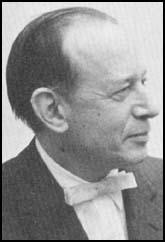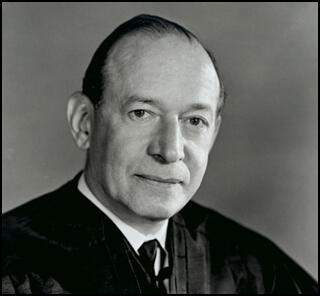Abe Fortas

Abe Fortas was born in Memphis, Tennessee on 19th June 19, 1910. His parents were Russian Jews who had arrived in the United States at the beginning of the 20th century.
Fortas studied at Yale Law School. He was also the editor-in-chief of the Yale Law Journal. In 1933 he moved to Washington where he worked for the Agriculture Department. During the Second World War Fortas worked in the Department of the Interior.
After the war Fortas joined with Thurman Arnold and Paul Porter to establish the firm of Arnold, Fortas and Porter. It eventually became one of the most important law firms in Washington.
Lyndon B. Johnson ran for Senator from Texas in 1948. His main opponent in the Democratic primary (then a one party state, contested elections occurred in primaries, not the general election) was Coke Stevenson. Johnson won by 87 votes but Stevenson accused him of ballot-rigging. Stevenson obtained an injunction preventing Johnson's name from appearing on the ballot for the general election. Fortas represented Johnson in this long-drawn out dispute. The case was investigated by J. Edgar Hoover and the FBI. Johnson was eventually cleared by Hoover of corruption and was allowed to take his seat in the Senate.
Fortas and Johnson now became close friends. Fortas' legal advice became important during the investigation into the activities of Billie Sol Estes and Bobby Baker. On 22nd November, 1963, Don B. Reynolds appeared before a secret session of the Senate Rules Committee. Reynolds told B. Everett Jordan and his committee that Johnson had demanded that he provided kickbacks in return for him agreeing to a life insurance policy arranged by him in 1957. This included a $585 Magnavox stereo. Reynolds also had to pay for $1,200 worth of advertising on KTBC, Johnson's television station in Austin. Reynolds had paperwork for this transaction including a delivery note that indicated the stereo had been sent to the home of Johnson.
Reynolds also told of seeing a suitcase full of money which Bobby Baker described as a "$100,000 payoff to Johnson for his role in securing the Fort Worth TFX contract". His testimony came to an end when news arrived that President John F. Kennedy had been assassinated.
As soon as Lyndon B. Johnson became president he contacted B. Everett Jordan to see if there was any chance of stopping this information being published. Jordan replied that he would do what he could but warned Johnson that some members of the committee wanted Reynold's testimony to be released to the public. On 6th December, 1963, Jordan spoke to Johnson on the telephone and said he was doing what he could to suppress the story because " it might spread (to) a place where we don't want it spread."
Fortas, who represented both Lyndon B. Johnson and Bobby Baker, worked behind the scenes in an effort to keep this information from the public. Johnson also arranged for a smear campaign to be organized against Don B. Reynolds. To help him do this J. Edgar Hoover passed to Johnson the FBI file on Reynolds.
On 17th January, 1964, the Senate Rules Committee voted to release to the public Reynolds' secret testimony. Johnson responded by leaking information from Reynolds' FBI file to Drew Pearson and Jack Anderson. On 5th February, 1964, the Washington Post reported that Reynolds had lied about his academic success at West Point. The article also claimed that Reynolds had been a supporter of Joseph McCarthy and had accused business rivals of being secret members of the American Communist Party. It was also revealed that Reynolds had made anti-Semitic remarks while in Berlin in 1953.
A few weeks later the New York Times reported that Lyndon B. Johnson had used information from secret government documents to smear Don B. Reynolds. It also reported that Johnson's officials had been applying pressure on the editors of newspapers not to print information that had been disclosed by Reynolds in front of the Senate Rules Committee.

In 1965 Johnson nominated Fortas as a member of the Supreme Court. During his time on the Court, Fortas continued to advise LBJ on political and legal matters. In June 1968, Earl Warren retired as Chief Justice of the Supreme Court. Johnson had no hesitation in appointing Fortas as his replacement. Johnson also appointed another friend from Texas, Homer Thornberry, to replace Fortas. The Senate had doubts about the wisdom of Fortas becoming Chief Justice. It was later discovered that Fortas had lied when he appeared before the Senate Judiciary Committee. In October, Fortas asked for his nomination to be withdrawn.
It was also revealed that a convicted financier named Louis Wolfson had agreed to pay Fortas $20,000 per year for the remainder of his life. This arrangement was condemned as ethically improper and Fortas was forced to resign from the Supreme Court in May 1969.
Fortas was unsuccessful in his attempt to rejoin Arnold, Fortas and Porter, the law firm he had helped create. In 1970 he started another law firm.
Abe Fortas died on 5th April, 1982.


